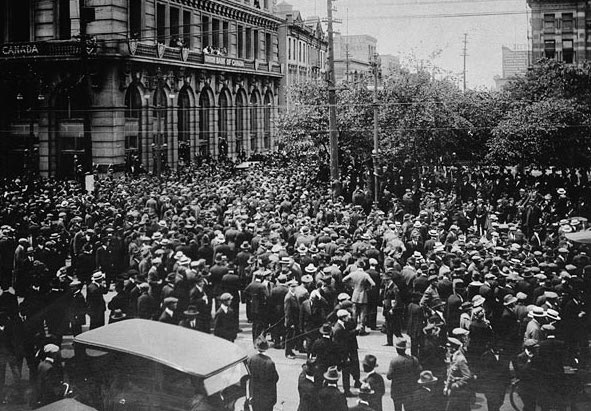The year 2019 marks the 75th anniversary of D-Day, and the 50th anniversary of Woodstock and the moon landing. Doubtless there are others. But in Manitoba, 2019 is the 100th anniversary of the Winnipeg General Strike and the 50th anniversary of Ed Schreyer’s election as premier of the first NDP government in Manitoba history. The two anniversaries are connected, of course. It may have taken 50 years, but the outsiders and the oppressed who showed their solidarity in 1919 eventually triumphed at the ballot box over the Manitoba elite who thought they had a divine right to run the province and to run it in their own interest.
If, as the title of a book about the strike claims, the state trembled in 1919, Manitoba’s deep state trembled in 1969 — and it still regards the NDP, out of power and in power, as folks who are just not supposed to be in charge, despite the fact that the NDP has been in power 32 of the last 50 years. It’s not even a policy thing at root — it’s sociological. Many who appreciate and often profit from the NDP commitment to do good things and to stimulate the economy by using government as a means to build public and private infrastructure nevertheless back their own class when push comes to shove, no matter how harmful their policies might be to the economy, the environment, or the health-care system. Ongoing support for the current premier of Manitoba is a stark case in point. He treats his supporters with contempt, and won’t meet with them, but better him than one of those people from the wrong side of the tracks.
There will be a dinner to celebrate the election of Ed Schreyer on June 25, 1969, on the exact day 50 years later. Ed Schreyer will be there. On June 23, it will be the 100th anniversary of the arrest and detention of J.S. Woodsworth on charges of seditious libel, an arrest that came after Woodsworth had stepped in to keep the strike newspaper Western Labour News going after the larger number of arrests of strike leaders some days earlier.
As Grace MacInnis, Woodsworth’s daughter and CCF MP, recalls in her biography of her father, entitled A Man to Remember, count four of the six counts against Woodsworth cited two quotations from the biblical prophet Isaiah, Chapter 10 verses 1-2, and 65: 21-22.
“Woe unto them that decree unrighteous decrees, and that write grievances which they have prescribed; to turn aside the needy from judgment, and take away the right from the poor of my people, that widows may be their prey and that they may rob the fatherless.”
“And they shall build houses and inhabit them, and they shall plant vineyards, and eat the fruit of them. They shall not build and another inhabit, they shall not plant and another eat, for as the days of a tree are the days of my people, and mine elect shall enjoy the work of their hands.”
In 2003 Svend Robinson introduced Bill C-250, a private member’s bill to amend the law concerning hate speech, to include the incitement of hate against persons on the basis of sexual orientation. The bill eventually was passed, but not before members of Parliament were inundated with letters, emails, and phone calls protesting an alleged attack on their particular brand of Christianity, and an attempt to make the Bible illegal. One prominent leader of the Christian right in Ontario implied that it was all a plot to jail those who would soon oppose expected legislation to legalize same-sex marriage. Speculation about the hellish afterlife of MPs who supported the bill was rampant. As a United Church Minister, I was often accused of heresy by fellow Christians who sometimes seemed not to know what the United Church stance on such issues was.
At the time all one could do was assure such protesters that the mere quoting of scripture was not the object of the legislation, a concern that was dealt with, if I recall correctly, by amending the bill to make this perfectly clear. Supplementary observations about the scarcity and the context, or actual meaning of references to homosexuality in scripture, as opposed to the hundreds of passages that refer to the moral challenge of poverty and exploitation, were unwelcome. So were observations or queries as to what kind of other things they might be planning to say that they were so worried about.
In retrospect, I should have assured them that the only time, as far as I know, that anybody had been charged and arrested in Canada for quoting scripture, was when J.S. Woodsworth quoted Isaiah in defence of the rights of working people, and that unless they were planning on a similar use of scripture to denounce economic oppression, they had nothing to worry about.
Bill Blaikie, former MP and MLA, writes on Canadian politics, political parties, and Parliament.
Photo: BiblioArchives / LibraryArchives/Flickr
Make rabble sustainable. Please consider supporting our work with a monthly donation and join us as we take on the 2019 election. Support rabble.ca today for as little as $1 per month!




